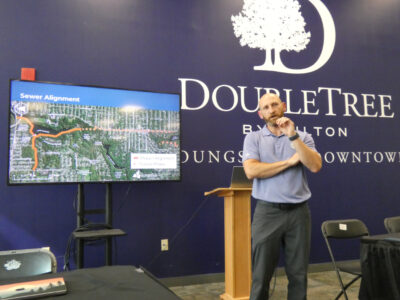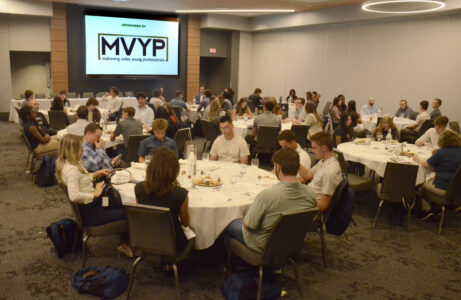Wastewater project to close areas around Lake Glacier

YOUNGSTOWN — Roads, trails and structures around Lake Glacier will be closed for more than two years when a project, costing up to $43 million, starts in January to keep wastewater from going into the Mill Creek Park water system.
Craig Mulichak, project manager for MS Consultants Inc., the Youngstown firm that designed the work, said at a Monday public meeting that the project will replace about 8,000 to 9,000 linear feet of sewer lines that range in size from 36 inches to 60 inches with a new 96-inch sewer line.
“You’re increasing capacity and eliminating the overflows in this area,” he said.
He added that the project will result in “significantly less volume of water that’s going untreated into the lakes and rivers, including the Mahoning River.”
There still will be untreated water going into the Mahoning River — just less of it, Mulichak said.
The first two phases of the project will start in January and be finished no later than May 29, 2028.
When the work starts, Mulichak said several roads around Lake Glacier will close for the entirety of the project.
They are: Price Road, West Glacier Drive, Calvary Run Drive, Tod Avenue and Weaver Road.
The only way people will be able to access Fellows Riverside Gardens during the project will be off Mahoning Avenue.
Also, four trails — Calvary Run, Old Tree, One Way Drive and Slippery Rock — will close during the project as well as the Slippery Rock Pavilion and Playground, the Lake Glacier Boathouse, Old Log Cabin, and picnic areas and parking lots by Lake Glacier, Mulichak said. The lake also will be closed to fishing and paddle boats.
“For safety and to get the project done, we have to close the roads for the project and then rebuild the roads,” Mulichak said.
City council met twice last week, but didn’t have enough votes to approve legislation to authorize the board of control to sign a contract for up to $43 million with Marucci & Gaffney Excavating Inc. of Youngstown for the work. Council is expected to give authorization at its Aug. 26 meeting.
MS Consultants, which designed the project for $4.8 million, estimates the work to cost between $28 million and $43 million.
The city administration, once it gets approval from city council, will finalize a price with Marucci & Gaffney.
Design work was supposed to start July 11, 2020, and construction was to begin April 5, 2024, under a consent decree the city signed in 2014 with the federal government.
The city missed those deadlines, but plans a compressed schedule.
The work is for the first two of four phases to an interceptor sewer project to keep wastewater from 13 lines from flowing into Mill Creek Park’s Lake Glacier and Lake Cohasset.
Most of the lines will be eliminated in the final two phases when work is done to Lake Cohasset, said Charles Shasho, the city’s deputy director of public works. The third part would be done by April 18, 2031, and the final part by Sept. 29, 2032, with design work starting next year.
Mary Krupa of Youngstown, who attended the public meeting, said: “Anything to purify our water is good. The roads are going to be closed for more than two years so we have to make adjustments to our normal routine. When it’s done it will be a significant drop in pollution though I was shocked there will still be overflows. I thought they were eliminating all the combined sewer overflows.”
Peter H. Milliken of Youngstown, who hikes and bikes through Mill Creek Park and attended Monday’s meeting, said the project is necessary.
“The water of Mill Creek will be much cleaner after this project is completed, but it would be cost-prohibitive to totally eliminate all overflows all the time,” he said. “There has to be a compromise and there obviously is one.”
The interceptor sewer is part of a larger wastewater improvement project the city is required to do under the federal consent decree.
The city, federal government and state of Ohio “successfully finalized a proposed resolution,” according to a June 20 federal court filing by all the parties, to the ongoing dispute that permits the city to reduce a phase of the wastewater improvement project.
The federal government wants to make the resolution official by Aug. 26 to “provide sufficient time for the United States to consider any public comment on the proposed consent decree amendment and advise the court and other parties as to the United States’ final position.”
Still in dispute is a $739,500 penalty the federal government is seeking from the city for delays to the wastewater project.


